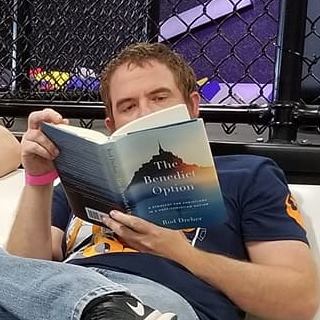A New Kind of Benedict Option
The Benedict Option: A strategy for Christians in a post-Christian nation by Rod Dreher
A short review by Martin W. Bender

What does it mean for Christians when culture becomes antagonistic to the faith? Rod Dreher, an eastern orthodox believer, offers an answer in The Benedict Option. He says only those with the greatest faith will persevere under the cultural strain. The book is a call to greater devotion by Christians. It also sees value in separation resembling the Benedictine monks. It is both warning and manual. For those who agree with the major premise, The Benedict Option is a light for a dark path.
Dreher begins by describing western culture as abandoning Christianity. He traces a slow segregation of the faith from culture through the history of philosophy from the middle ages to today. As this process continues, he argues the modern way of living the Christian life will no longer be viable. A move away from the caricature of Christianity most western believers practice must become a robust expression of the faith. This more robust faith is what he describes for the rest of the book.
Today’s western Christian doesn’t understand persecution. Only now are early examples beginning to appear. The slow erosion of religious liberty under the guise of sexual revolution is the starting point. Christianity will be limited to religious ghettos. Here, believers dwell exiled from the secular culture. Most believers will not know how to live in a society in which they have no political power. Dreher believes the time of ease for Christians in the west is coming to an end. A change in basic Christian living is necessary.
The change necessary is to take the faith more seriously. With a title like The Benedict Option the level of dedication to which Dreher is calling the church is obvious. Christians should follow the example of the ascetics from Christian history rather than living in light of secular culture. A possible separation in space, but definitely in attitude. A way of living that relies on God rather than the power structures of this world.
The relationship between political power and the believer needs to be rethought. Christian's must recognize the failure of the moral majority to bring about theonomy. Moral action can be legislated, but moral thought and feeling are left to individuals. Not criminalizing abortion shows the failure of Christians to use political influence well. American believers need to reconsider the way in which they interact with politics. A move to the local from the national level is vital to making small, yet visible change.
Other areas of note are those of education and technology. There is much to say about the ability of state schools to develop a worldview. Believing parents and educators in some places compete in the forming of young minds. Christians should acknowledge this and consider homeschooling or participating in a classical Christian school. Technology also plays a part in informing one’s understanding of the world. The use of technology should focus on the glorification of God. There is a historic precedent. The Reformers used the printing press making Protestant Reformation a continental event.
The goal of the book is to show believers the importance of being faithful in their cultural situation. The Benedict Option is a fancy name for Christians being Christians. It also serves as an alarm to the increasing pace of secularization in the United States.
Thoughts
While I enjoyed the book, and think many of its ideas are worthwhile there are a few problems. The assumption that the west, especially the United States, will continue its descent into secularism seems exaggerated. Over the past few decades, there has been a movement away from Christian values, but there have also been cultural revivals in the past. Not all trends continue to the expected result. There was not enough hope for culture communicated in the book.
The linking of Catholic, Orthodox, and Protestants into a single Christianity is dangerous. There are theological and practical differences between these groups that are not addressed. The use of non-orthodox groups as examples for Christians to follow is equaling troubling. This work did not intend to discuss theology, but there must be examples of family development that uphold orthodox positions. Theology and methodology inevitably reflect one another.
The Benedict Option reminds me of Brian McLaren’s A New Kind of Christian. Both books look at how Christianity is being lived in the United States in the aftermath of the sexual revolution. They both ask the reader to be serious about their faith in light of challenges facing American Christians. Both appeal to past expressions of Christianity as superior to what is common today. Where they differ is in their optimism. McLaren wrote before 9/11 and seems very positive about the possibility of a “new” Christianity able to handle the rigors of the post-modern world. He seems to embrace the secularization of the culture and believes dwelling in it to be possible while leading a Christian life. Dreher lacks this optimism and seems to support a Christian exodus from the culture – something far afield from scripture. If you are only going to read one stick with Dreher. His writing is more direct and doesn’t wander around his points like McLaren.
You can buy the book here: https://www.amazon.com/Benedict-Option-Strategy-Christians-Post-Christian/dp/0735213291/ref=sr_1_1?ie=UTF8&qid=1515434577&sr=8-1&keywords=the+benedict+option
Great review, and it makes me really want to read the book. On that note, thanks for sharing the link to buy it. I hope you'll be posting more book reviews for Christians like myself.
Thanks for reading. Dreher writes really well and the book flows nicely. I finished it in a couple days.